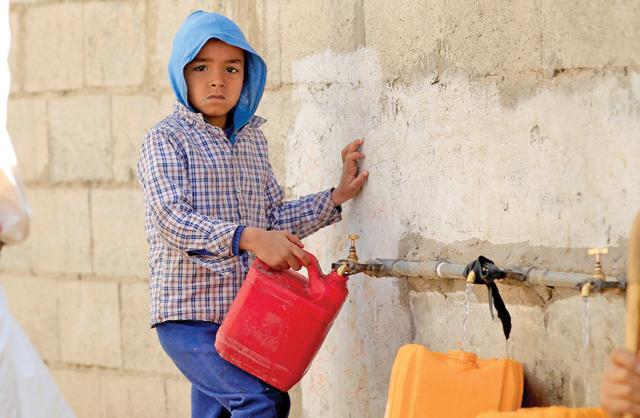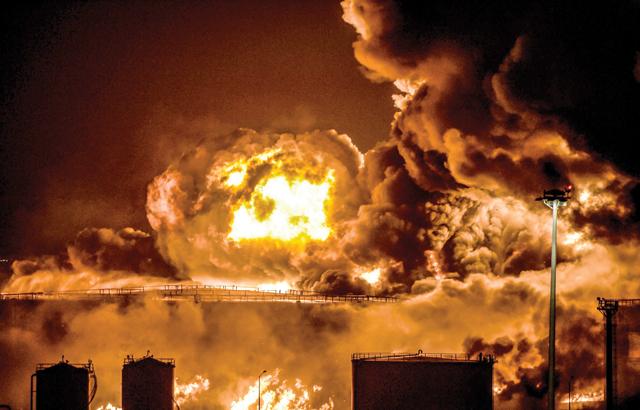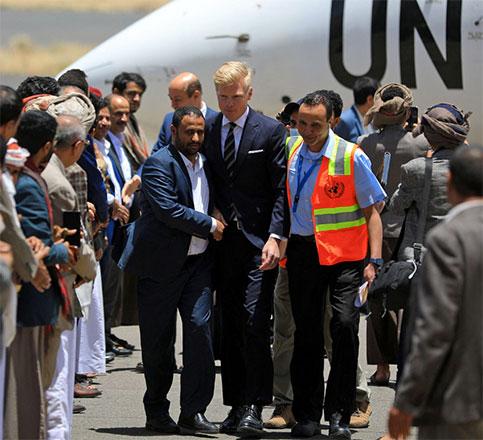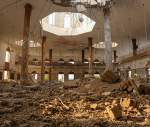You are here
War-torn Yemen holds breath for breakthrough truce
By AFP - Apr 02,2022 - Last updated at Apr 02,2022

A Yemeni child fills his jerrycan with drinking water from a donated tank amid acute shortage in the capital Sanaa on Thursday (AFP photo)
SANAA — Yemen's warring parties are set to lay down their weapons for the first nationwide truce since 2016 on Saturday, with all eyes on whether the UN-brokered ceasefire will hold.
The Iran-backed Houthi rebels and Saudi-led coalition have both agreed to observe the two-month truce, which is to take effect at 16:00 GMT on the first day of the Muslim holy fasting month of Ramadan.
Yemen's intractable war has killed hundreds of thousands directly or indirectly and displaced millions, triggering the world's worst humanitarian crisis, according to the United Nations.
Previous ceasefires have been ineffective. A national truce ahead of peace talks in April 2016 was violated almost immediately, as were other ceasefires that year.
A 2018 agreement to cease hostilities around rebel-held Hodeida port, a lifeline for the Arab world's poorest country, was also largely ignored.
Both the Houthis and Saudi Arabia have welcomed the latest initiative, which follows a surge in attacks but also increasing diplomacy including ongoing talks, snubbed by the rebels, in Riyadh.
"This time I am optimistic. This truce is unlike all the previous ones," Asmaa Zayed, a college student who also works as a cashier in Hodeida, told AFP.
"The fact it comes with Ramadan gives us a lot of hope. This war started when I was 15 years old and turned all my dreams into nightmares."
'Suffered immensely'
Under the agreement, all ground, air and sea military operations in Yemen and across its borders would stop, UN special envoy for Yemen Hans Grundberg said in his announcement.
Fuel ships would be allowed into Hodeida Port and commercial flights could resume to certain regional destinations from the airport in the Houthi-held capital Sanaa, both key demands of the insurgents before they consider peace talks.
The two sides have also agreed to meet to open roads in Taez and other governorates, Grundberg said, adding the truce could be renewed with their consent.
“All Yemeni women, men and children that have suffered immensely through over seven years of war expect nothing less than an end to this war,” said the Swedish diplomat.
With fighting in Yemen at a stalemate, the Houthis launched a series of drone-and-missile attacks on Saudi Arabia and coalition partner the United Arab Emirates this year, often targeting oil facilities.
The coalition has responded with air strikes.
Last week, on the seventh anniversary of the Saudi-led military coalition’s intervention, and a day after an attack on an oil plant within sight of the Formula One Grand Prix in the Saudi city of Jeddah, the Houthis announced a three-day unilateral ceasefire.
The coalition then announced its own truce from Wednesday, ahead of discussions with international partners in Riyadh. The rebels declined to attend the talks in an “enemy” country.
Saudi Arabia on Saturday expressed its “support” for the UN ceasefire, which was also welcomed by US President Joe Biden and UN Secretary General Antonio Guterres.
“These are important steps, but they are not enough,” Biden said. “The ceasefire must be adhered to, and as I have said before, it is imperative that we end this war.”
British Prime Minister Boris Johnson has welcomed the deal, calling it “a window of opportunity to finally secure peace and end the humanitarian suffering”.
On Saturday, France foreign ministry said the truce was a “major step forward”, and offered “full support” for UN efforts towards a permanent ceasefire.
The major question now is whether the truce will be observed.
The Norwegian Refugee Council called it “an essential development for millions of Yemenis” and “the start of a new chapter”, while Save the Children said they hoped it would offer a “much-needed respite from all the violence”.
The war in Yemen started when the Houthis took control of Sanaa in 2014, prompting the Saudi-led intervention in March of the following year in support of the ousted government.
It plunged what was already the Arab world’s poorest country into years of crisis, with failing infrastructure and services and 80 per cent of the 30 million population dependent on aid.
“Everything around us reeks of death and war,” said Zayed, the student in Hodeida. “I think I will go into a depression if this truce ends or fails.”
Related Articles
RIYADH — Yemen's Houthi rebels have proposed a ceasefire and peace talks to end the country's crippling war in return for opening the capita
SANAA — The United Nations special envoy arrived in Yemen on Wednesday for talks on reopening routes to a rebel-blockaded city that has prov
SANAA — The UN envoy for Yemen landed in rebel-held Sanaa Monday for talks aimed at shoring up a truce between rebels and a government allia


















